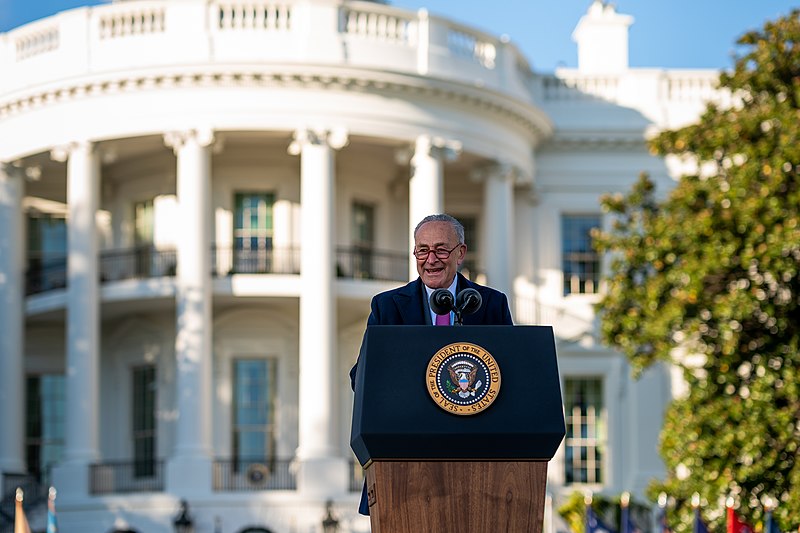With voting rights becoming a major issue, the bills that have arrived at the US Senate have yet to be subject to debate due to Republican opposition. Senate Majority Leader Chuck Schumer revealed a last-ditch strategy to override the GOP’s filibuster and force a debate over the bills.
In an internal memo to congressional Democrats, Schumer outlined his strategy to work around the Senate filibuster to force a debate over the voting rights bills that remain in limbo. The Senate Majority Leader’s plan involved obscure procedural moves that started Wednesday night in the House. The House at the time moved before midnight to replace a text of an unrelated NASA proposal with the text from the John Lewis Voting Rights Advancement Act and the Freedom to Vote Act.
The amended piece of legislation would be brought to the Senate as a “message,” which is a step that will allow Democrats to open debate on the measure without the need for the 60-vote threshold. Senate Republicans have filibustered debate on the voting rights bills four times.
“With this procedure, we will finally have an opportunity to debate voting rights legislation – something that Republicans have thus far denied,” wrote Schumer in the memo.
“I did not expect this outcome when I first introduced the NASA Enhanced Use Leasing Extension Act. If my legislation will help overcome the filibuster, the Senate can finally have the long-overdue debate on voting rights this country deserves,” Democratic Rep. Don Beyer told reporters.
Schumer ultimately acknowledged that his strategy would only delay the use of the filibuster, which many Democrats have criticized as a relic of the Jim Crow era and must be abolished completely. Senate Democrats will still need 10 Republicans to vote in support of the legislation in order to come to a final vote.
In other related news, Senate Democrats turned the tables on the Republicans during a judicial confirmation hearing this week. Senate Judiciary Chairman Dick Durbin held a hearing for nominee Andre Mathis for an appeals court post that has historically been designated for a nominee from Tennessee despite objections from the state’s two Republican senators.
A long-running committee tradition that is known as “blue slips” usually gives home-state senators significant influence over the nomination. Republicans used this tradition to block Barack Obama’s nominees if the senators did not return the slips of paper. Republicans ended the practice under Donald Trump.
Durbin noted that the GOP moved 18 nominees through the process, eventually confirming 17 of them. Durbin said that the committee should look into codifying the tradition into the rules after the next election. Tennessee GOP Senator Marsha Blackburn later complained about the move being used against Republicans.



 Macron Urges Emergency UN Security Council Meeting as US-Israel Strikes on Iran Escalate Middle East Tensions
Macron Urges Emergency UN Security Council Meeting as US-Israel Strikes on Iran Escalate Middle East Tensions  Middle East Conflict Escalates After Khamenei’s Death as U.S., Israel and Iran Exchange Strikes
Middle East Conflict Escalates After Khamenei’s Death as U.S., Israel and Iran Exchange Strikes  Marco Rubio to Brief Congress After U.S.-Israeli Strikes on Iran
Marco Rubio to Brief Congress After U.S.-Israeli Strikes on Iran  U.S. Deploys Tomahawks, B-2 Bombers, F-35 Jets and AI Tools in Operation Epic Fury Against Iran
U.S. Deploys Tomahawks, B-2 Bombers, F-35 Jets and AI Tools in Operation Epic Fury Against Iran  Trump Says U.S. Combat Operations in Iran Will Continue Until Objectives Are Met
Trump Says U.S. Combat Operations in Iran Will Continue Until Objectives Are Met  Australia Rules Out Military Involvement in Iran Conflict as Middle East Tensions Escalate
Australia Rules Out Military Involvement in Iran Conflict as Middle East Tensions Escalate  Suspected Drone Strike Hits RAF Akrotiri Base in Cyprus, Causing Limited Damage
Suspected Drone Strike Hits RAF Akrotiri Base in Cyprus, Causing Limited Damage  AI is already creeping into election campaigns. NZ’s rules aren’t ready
AI is already creeping into election campaigns. NZ’s rules aren’t ready  Argentina Tax Reform 2026: President Javier Milei Pushes Lower Taxes and Structural Changes
Argentina Tax Reform 2026: President Javier Milei Pushes Lower Taxes and Structural Changes  Trump Announces U.S. Strikes on Iran Navy as Conflict Escalates
Trump Announces U.S. Strikes on Iran Navy as Conflict Escalates  Does international law still matter? The strike on the girls’ school in Iran shows why we need it
Does international law still matter? The strike on the girls’ school in Iran shows why we need it  Trump Launches Operation Epic Fury: U.S. Strikes on Iran Mark High-Risk Shift in Middle East
Trump Launches Operation Epic Fury: U.S. Strikes on Iran Mark High-Risk Shift in Middle East  Iran Supreme Leader Ayatollah Ali Khamenei Killed in Israeli, U.S. Strikes: Reuters
Iran Supreme Leader Ayatollah Ali Khamenei Killed in Israeli, U.S. Strikes: Reuters  Why did Iran bomb Dubai? A Middle East expert explains the regional alliances at play
Why did Iran bomb Dubai? A Middle East expert explains the regional alliances at play  HHS Adds New Members to Vaccine Advisory Panel Amid Legal and Market Uncertainty
HHS Adds New Members to Vaccine Advisory Panel Amid Legal and Market Uncertainty  Failure of US-Iran talks was all-too predictable – but Trump could still have stuck with diplomacy over strikes
Failure of US-Iran talks was all-too predictable – but Trump could still have stuck with diplomacy over strikes  UK Accepts U.S. Request to Use British Bases for Defensive Strikes on Iranian Missiles
UK Accepts U.S. Request to Use British Bases for Defensive Strikes on Iranian Missiles 































